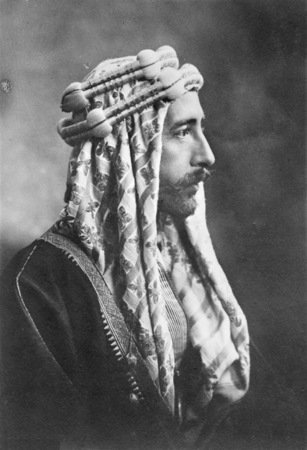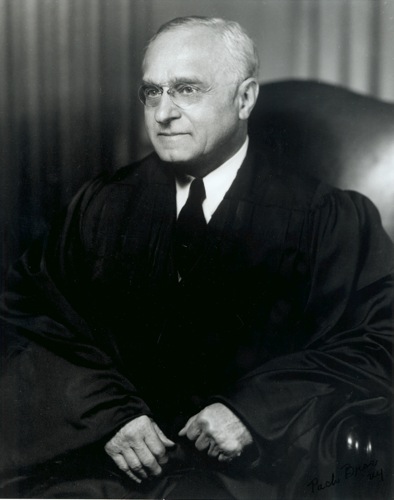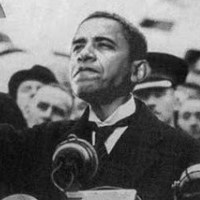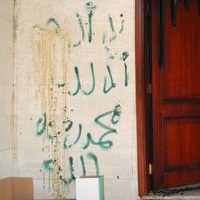![]()
Sat, Nov 27, 2010 | Edited by Crethi Plethi

Emir Faisal Ibn Hussein, son of Sharif Husayn of Mecca, leader of the Arab revolt against the Ottoman rule in the Middle East
Faisal-Frankfurter Correspondence At the Paris Peace Conference, 1919
Following World War I, the Emir Faisal Bin Hussein [son of Husayn, Sharif of Mecca] signed an agreement as part of the 1919 Paris Peace Conference with Dr. Chaim Weizmann in support of a Jewish homeland in Palestine and an Arab nation in a large part of the Middle East.
Following this [Faisal-Weizmann] Agreement, Emir Faisal exchanged letters with Judge Felix Frankfurter [who served as a Zionist delegate of the American delegation to the Paris Peace Conference].
In these letters Faisal expresses his support for the Jewish nationalist movement and the Jewish claims for a homeland in Palestine.
Letter from His Royal Highness Emir Faisal Ibn Hussein, Son of Husayn Ibn Ali, Sharif of Mecca, to Judge Felix Frankfurter, associate of Dr. Chaim Weizmann:
DELEGATION HEDJAZIENNE
Paris Peace Conference
March 3, 1919Dear Mr. Frankfurter,
I want to take this opportunity of my first contact with American Zionists to tell you what I have often been able to say to Dr. Weizmann in Arabia and Europe.
We feel that the Arabs and Jews are cousins in having suffered similar oppressions at the hands of powers stronger than themselves, and by a happy coincidence have been able to take the first step towards the attainment of their national ideals together.
The Arabs, especially the educated among us, look with the deepest sympathy on the Zionist movement. Our deputation here in Paris is fully acquainted with the proposals submitted yesterday by the Zionist Organisation to the Peace Conference, and we regard them as moderate and proper. We will do our best, in so far as we are concerned, to help them through: we will wish the Jews a most hearty welcome home.
With the chiefs of your movement, especially with Dr. Weizmann, we have had and continue to have the closest relations. He has been a great helper of our cause, and I hope the Arabs may soon be in a position to make the Jews some return for their kindness. We are working together for a reformed and revived Near East, and our two movements complete one another. The Jewish movement is national and not imperialist. Our movement is national and not imperialist, and there is room in Syria for us both. Indeed I think that neither can be a real success without the other.
People less informed and less responsible than our leaders and yours, ignoring the need for co-operation of the Arabs and Zionists have been trying to exploit the local difficulties that must necessarily arise in Palestine in the early stages of our movements. Some of them have, I am afraid, misrepresented your aims to the Arab peasantry, and our aims to the Jewish peasantry, with the result that interested parties have been able to make capital out of what they call our differences.
I wish to give you my firm conviction that these differences are not on questions of principle, but on matters of detail such as must inevitably occur in every contact of neighbouring peoples, and as are easily adjusted by mutual good will. Indeed nearly all of them will disappear with fuller knowledge.
I look forward, and my people with me look forward, to a future in which we will help you and you will help us, so that the countries in which we are mutually interested may once again take their places in the community of civilised peoples of the world.
Believe me,
Yours sincerely,
(Sgd.) Faisal
Letter of reply from Judge Felix Frankfurter to Emir Faisal Ibn Hussein:
Paris Peace Conference
March 5, 1919
Royal Highness,
Allow me, on behalf of the Zionist Organisation, to acknowledge your recent letter with deep appreciation.
Those of us who come from the United States have already been gratified by the friendly relations and the active cooperation maintained between you and the Zionist leaders, particularly Dr. Weizmann. We knew it could not be otherwise; we knew that the aspirations of the Arab and the Jewish peoples were parallel, that each aspired to re-establish its nationality in its own homeland, each making its own distinctive contribution to civilisation, each seeking its own peaceful mode of life.
The Zionist leaders and the Jewish people for whom they speak have watched with satisfaction the spiritual vigour of the Arab movement. Themselves seeking justice, they are anxious that the just national aims of the Arab people be confirmed and safeguarded by the Peace Conference.
We knew from your acts and your past utterances that the Zionist movement — in other words the national aim of the Jewish people — had your support and the support of the Arab people for whom you speak. These aims are now before the Peace Conference as definite proposals by the Zionist Organisation. We are happy indeed that you consider these proposals “moderate and proper,” and that we have in you a staunch supporter for their realisation.
For both the Arab and the Jewish peoples there are difficulties ahead — difficulties that challenge the united statesmanship of Arab and Jewish leaders. For it is no easy task to rebuild two great civilisations that have been suffering oppression and misrule for centuries. We each have our difficulties we shall work out as friends, friends who are animated by similar purposes, seeking a free and full development for the two neighbouring peoples. The Arabs and Jews are neighbours in territory; we cannot but live side by side as friends.
Very respectfully,
(Sgd.) Felix Frankfurter



 RSS
RSS











Faisal-Frankfurter Correspondence At The Paris Peace Conference 1919 | #Israel #Arabs #Palestine #Zionism http://j.mp/hZF1HK